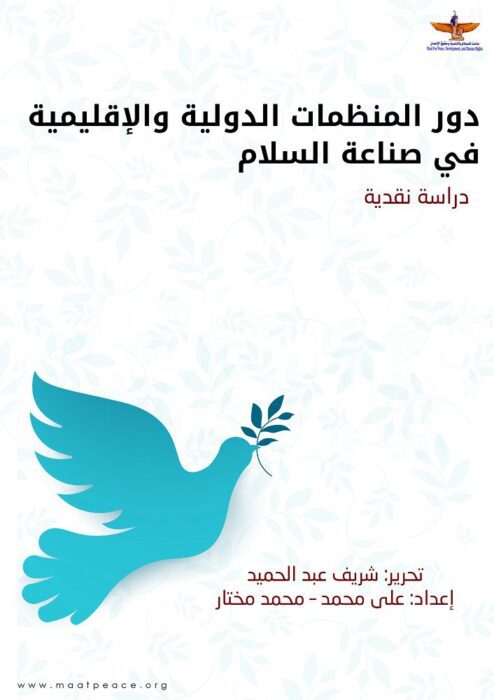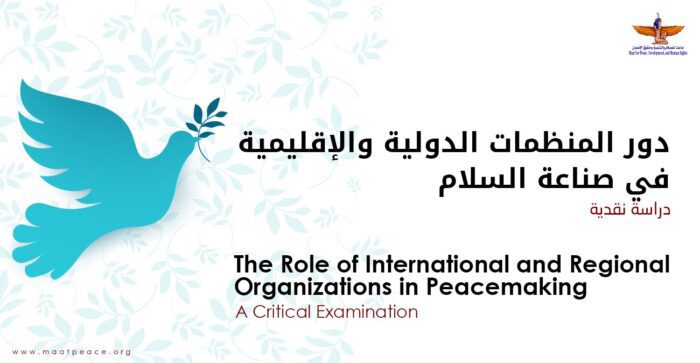Okeil: The League of Arab States faces considerable challenges in settling conflicts and achieving peace in the region
Sherif Abdul-Hamid: The challenges facing the international organizations are greater than their ability to achieve peace
On the International Day of Peace ("Peace Day"), which is observed around the world each year on 21 September, Maat for Peace, Development and Human Rights issues a new study entitled "The Role of International and Regional Organizations in Peacemaking... A Critical Examination". The study indicated that the United Nations, among other international and regional organizations, have assumed various roles to achieve mediation and peacekeeping, in addition to other peacebuilding interventions in conflict and post-conflict stages. These roles have often taken the shape of peace agreements and understandings that aim at reducing tensions and building confidence among the parties. However, these efforts have not always been effective.
The study called for the urgent need to develop the working mechanisms of these organizations. The search for innovative solutions that keep pace with the rapid changes in the international system is no longer a luxury, and a comprehensive approach to achieve and preserve peace as well as address its root causes has become a necessity imposed by the current developments at the international and national levels. Achieving peace is no longer linked to the prevention of wars only, but also includes the eradication of poverty and the achievement of sustainable development goals, given the intertwining relationship between peace and the achievement of sustainable development goals, in addition to achieving an equitable distribution of wealth, promoting inclusive dialogue between the various parties, and building strong and accountable institutions and local communities.
The study used a set of general, measurable and observable indicators to infer the extent of the success of international and regional institutions in the processes of achieving and promoting peace based on a comprehensive approach to treatment that includes achieving one or more indicators in the performance of the organization, to prevent direct violence operations or undermine any cause that creates instability. The first indicator is related to the extent to which the organization succeeds in supporting and achieving mediation, negotiation, dialogue, and good offices among the conflicting parties. The second indicator is related to the capabilities of financing peace-making and strengthening processes, which stimulates the improvement of the technical and strategic capacity of the parties related to maintaining peace gains, in addition to participation in the negotiations. While the third indicator indicates the extent to which international institutions have succeeded in exploiting the poor humanitarian and health conditions in persuading the parties to the conflict to reach a political settlement that satisfies all parties, ends conflict situations, and achieves sustainability.
The study used a set of general, measurable and observable indicators to infer the extent of the success of international and regional institutions in the processes of achieving and promoting peace based on a comprehensive approach to treatment that includes achieving one or more indicators in the performance of the organization, to prevent direct violence operations or undermine any cause that creates instability. The first indicator is related to the extent to which the organization succeeds in supporting and achieving mediation, negotiation, dialogue, and good offices among the conflicting parties. The second indicator is related to the capabilities of financing peace-making and strengthening processes, which stimulates the improvement of the technical and strategic capacity of the parties related to maintaining peace gains, in addition to participation in the negotiations. While the third indicator indicates the extent to which international institutions have succeeded in exploiting the poor humanitarian and health conditions in persuading the parties to the conflict to reach a political settlement that satisfies all parties, ends conflict situations, and achieves sustainability.
Ayman Okeil, an international human rights expert and President of Maat, stated that international and regional organizations face a real danger that threatens their ability to carry out any tasks entrusted to them. The United Nations, for example, is facing the most serious funding crisis since its inauguration. As of October 2019, the international organization embarked on the implementation of the largest austerity programme in its history, and the level of deficit in its budget reached 711 million dollars out of 2.85 billion dollars in the total budget of the organization, as a result of the failure of about 51 countries to pay the dues imposed on them, including two major funders of the international organization, the United States and Brazil. In April 2020, the United Nations appealed to member states to expedite the payment of their dues to the organization’s budget to face the cash deficit suffered by the organization and the mounting financial pressures, particularly in light of the outbreak of the Coronavirus. Okeil added that the League of Arab States is another vivid example of the deficit of financial resources dedicated to regional organizations. The League of Arab States has been suffering from a chronic deficit for a long time that reached 60% in its annual budget, due to the non-payment of the dues imposed on it by the member states of the organization, which undermines and weakens the work of the League in settling conflicts and achieving peace in the region. For his part, Sherif Abdul-Hamid, director of the Research and Studies Unit at Maat, said that despite the efforts made over the past decades to establish a comprehensive and sustainable peace, the challenges facing these organizations remain greater than their ability to implement all the decisions issued by them. There are some issues that cannot be approached and these organizations, namely the United Nations and the League of Arab States, have failed to settle them, such as the Palestinian issue and the Yemeni crisis that has entered its seventh year since the Houthis took control of the capital, Sanaa, whit no solution looming ahead. Abdul-Hamid added that international and regional organizations are making unremitting efforts to promote and preserve peace activities and work to prevent the exacerbation of conflicts and wars and reach a comprehensive and sustainable peace. However, funding operations remain an obstacle to these organizations, as they are still very insignificant and filled with structural gaps if compared to the desired level, in a way that contributes to reducing tension in conflict areas and promoting peace.
![]()
 |











